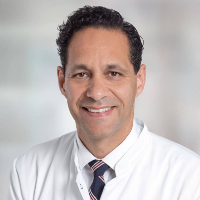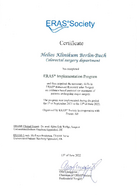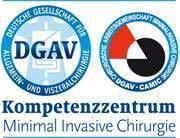Surgical Transanal Excision for Rectal Cancer treatment in Germany
Treatment prices are regulated by national law of the corresponding countries, but can also include additional hospital coefficients. In order to receive the individual cost calculation, please send us the request and medical records.

Department of General, Abdominal Surgery and Surgical Oncology
The Department of General, Abdominal Surgery and Surgical Oncology offers the full range of services in these medical fields. Whenever possible, operations are performed using minimally invasive techniques, which are the gold standard of modern surgery. The outstanding quality of medical care is confirmed by numerous prestigious certificates, including certificates from the German Cancer Society, the German Hernia Society, etc. In addition, the department provides innovative hyperthermic intraperitoneal chemotherapy (HIPEC), which is available only in the most progressive clinics in Europe.







Department of General and Abdominal Surgery, Colorectal Surgery, Hepatopancreatobiliary Surgery, Hernia Surgery and Bariatric Surgery
The Department of General and Abdominal Surgery, Colorectal Surgery, Hepatopancreatobiliary Surgery, Hernia Surgery and Bariatric Surgery provides the full range of surgical treatment in its field of competence. The department's highly qualified surgeons annually perform about 2,000 surgical interventions. Extensive clinical experience allows the specialists to perform even particularly complex operations. The department’s advanced operating rooms serve for surgery to treat gastrointestinal diseases, liver, gallbladder, bile duct, pancreatic, rectal, anal and colon pathologies. The medical facility also successfully performs operations to treat hernias: inguinal, umbilical, and anterior abdominal wall hernias. In addition, the department's doctors deal with the surgical treatment of morbid obesity. Minor traumatic laparoscopic interventions are considered the gold standard, which guarantee a patient minimal risks and rapid postoperative restoration. Surgeons tell the patient in detail about their upcoming treatment and, in every possible way, support them in their recovery.







Department of General and Abdominal Surgery, Colorectal Surgery, Endocrine Surgery and Hernia Surgery
The Department of General and Abdominal Surgery, Colorectal Surgery, Endocrine Surgery and Hernia Surgery offers the full range of modern surgical interventions in the areas of its specialization. Every year, the medical facility performs more than 2,500 surgical interventions on an inpatient and outpatient basis. The department has vast clinical experience in the field of minimally invasive surgery, which allows the patient to avoid severe pain and prolonged hospitalization. In addition, the department offers robotic surgery using the most modern models of the da Vinci surgical system. The medical facility has the status of the Reference Center for Minimally Invasive Surgery and Hernia Surgery. Surgical treatment of cancer is one of the department's clinical priority focuses. A large number of da Vinci robot-assisted interventions are performed here for gastrointestinal cancers. The department holds a leading position in the use of the da Vinci surgical system in the treatment of rectal and sigmoid cancer patients. The operating rooms of the medical facility are equipped with the very latest technology, while hygiene and safety standards are at the highest level as well. Prior to surgery, the patient undergoes a comprehensive examination. Doctors also assess the risks of the upcoming operation and its expected results. With appropriate clinical indications, preference is always given to minimally invasive surgery.






Rectal cancer is a malignant tumor that often develops from the cells of the mucous tissue lining of the rectum, and less often – from blood vessels, epithelium of the anal canal, or anal glands.
Rectal cancer overview
The rectum is the last link in the digestive system and is the final section of the large intestine located in the small pelvis.
In terms of morbidity and mortality, rectal cancer occupies one of the leading places among oncological diseases. Currently, rectal cancer accounts for about 4-5% of all cancers and about 70% of all bowel cancers.
Most often, a rectal tumor is detected in patients over the age of 40, but it can arise in patients who are 20-30 years old. Considering the danger of the disease, timely treatment of rectal cancer is essential.
At its early stages, rectal cancer does not have pronounced symptoms. However, with the growth of the tumor, patients can experience a feeling of dull pain during defecation, presence of mucus and blood in stool. It should be noted that the symptoms of this disease could be very similar to the signs of internal hemorrhoids.
At the later stages, intestinal obstruction, bleeding, as well as other complications are observed such as peritonitis, phlegmon, or abscess. The tumor can grow into the bladder and cause compression of the ureters that make rectal cancer treatment in Germany also a subject of urology.
Diagnostics
The most simple method for diagnosing a tumor is a digital rectal examination, but patients often avoid this method during preventive check-ups.
The most common method of instrumental examination is colonoscopy, which allows doctors to combine the medical examination of the rectum with a biopsy. This examination is extremely efficient. There’s also the method of endoscopic examination, which reveals detailed features of rectal cancer.
Additional examination methods include:
- Pelvis MRI. In addition to assessing the local spread of rectal cancer, MRI is indispensable for the individual planning of surgery, radiation, and chemotherapy. The use of MRI data in the planning of the treatment can significantly reduce the number of complications.
- Ultrasound examination of the abdominal cavity. It is carried out in order to exclude the presence of lymph node metastases. When the metastatic process in the lymph nodes is identified, their biopsy is required. The biopsy is a safe and painless procedure.
- Positron emission tomography.
- Medical laboratory tests. Medical laboratory tests include an assessment of the level of tumor markers and an assessment of the degree of impairment of the kidneys and liver function.
Treatment
Treatment of rectal cancer is one of the most complex problems. It attracts attention of the world's leading oncology specialists. This is due to a significant increase in the incidence of rectal cancer, which is the third and most common cancer in men and the second in women.
Currently, there are three main methods of treatment of rectal cancer:
- Surgery
- Radiation therapy
- Chemotherapy
The modern medical approaches to the treatment of rectal cancer are complex or multidisciplinary, and usually include single procedures of surgery and radiation and chemotherapy or their combination.
One of the main methods for the treatment of rectal cancer is, of course, the surgical method, which largely determines the effectiveness of the overall treatment of rectal cancer.
Surgery is the main treatment of rectal cancer. Depending on the size and location of the tumor, the main surgical procedures include intra-abdominal resection or anterior rectal resection, low anterior rectal resection, and transanal endoscopic microsurgery.
Usually, the endoscopic electroexcision through a colonoscope, the transanal excision of tumors, or the transanal endoscopic microsurgery are used in the treatment of rectal cancer if minimally invasive resection is impossible.
Anterior resection is the type of surgery for tumors located in the upper part of the rectum.
Low anterior resection is performed when tumors are located in the middle and lower parts of the rectum. As with anterior resection, an incision is made in the lower abdomen. Compared to anterior resection, a low anterior resection removes more tissue, including almost the entire rectum.
Low anterior resection is often used in treatment of rectal cancer located in its lower region. With this surgery for the treatment of rectal cancer, the frequency of disease recurrence is minimal. Since after this surgery the creation of a permanent stoma is not required, this surgery is considered sphincter-preserving. However, a temporary stoma may be required to protect the anastomotic site during healing after surgery.
Improvement of the surgical techniques made it possible to perform rectal cancer surgery in patients who had previously undergone abdominal-perineal resection, which allowed 40% of patients to avoid the formation of a permanent colostomy and eliminated severe complications after surgery.
Surgical transanal excision
The presence of benign rectal tumors in patients with severe concomitant pathology led to the search for low-traumatic and at the same time radical surgical methods for rectal cancer to be treated.
The rectum is a surgical area that is difficult to access. Nevertheless, even benign lesions there should be treated. Transanal endoscopic microsurgery is a method of treating both benign and malignant neoplasms of the rectum.
For a long time, the use of endoscopic surgical interventions has been limited. Although, transanal endoscopic microsurgery has the same level of treatment results as standard surgery.
A specific set of tools have been developed for this type of surgery, which, based on the results of their use all over the world, have proven their reliability, convenience, and efficiency. With the introduction of transanal endoscopic microsurgery, it became possible to perform endoscopic medical operations using a wide-bore rectoscope. Up to four instruments can be used simultaneously during the transanal endoscopic microsurgery. Additional optics allow transmitting the video signal to the operating team.
Medical application of the transanal endoscopic microsurgery offers doctors full visual control. Transanal endoscopic microsurgery provides the possibility of precise removal of tumors from any part of the rectum, and the possibility of transanal excision at the level of the submucosal layer.
It is performed by the laparoscopic method, which does not require any incisions or punctures. The rectoscope is connected to the operating table with fasteners; thus, a stable access to the surgical site is achieved.
The development of transanal endoscopic microsurgery is an indisputable achievement of surgery. Transanal endoscopic microsurgery is of particular relevance since the initial stages of rectal cancer are very common.
The success of the treatment of rectal cancer patients with transanal endoscopic microsurgery makes it possible to avoid the formation of a permanent colostomy in 40% of patients. Transanal endoscopic microsurgery is an alternative to traditional methods of surgical rectal cancer treatment in Germany for patients with early stages of rectal cancer.
To reduce the risk of recurrence after transanal endoscopic microsurgery, radiation therapy is performed, which makes it possible to obtain good functional results and alleviate complications after surgery.
It should also be noted that up to 40% of rectal surgeries result in colostomy formation. And such operations are the turning point in the life of patients since rectal cancer that is treated with the formation of a permanent stoma leads to disability.
Some patients refuse surgery because of the fear that they will lose the ability to control stool and will not be able to cope with a temporary stoma. However, it should be noted that rectal cancer can hardly be treated without surgery. Less invasive procedures, such as transanal endoscopic microsurgery, have a lower risk of postoperative complications at this point.
As well as with low anterior resection, transanal endoscopic microsurgery of the tumor does not require creating the permanent stoma. This operation is sphincter-preserving.
However, other types of resection of a part of the rectum with the prognosis of further functional disorders development reduce the medical results of the treatment of rectal cancer. Transanal endoscopic microsurgery avoids these problems.
Benefits of transanal endoscopic microsurgery
Transanal endoscopic microsurgery can serve as an alternative to methods of local and intra-abdominal tumor removal. This technique does not lead to such complications as the formation of fecal fistula, abscesses of rectal tissue, sacral osteomyelitis, which occur after the conventional surgery.
The main advantage of transanal endoscopic microsurgery is the organ-preserving nature of the intervention.
In this operation, the surgeon does not remove the entire rectum, but only part of its wall where the tumor is located. Since only part of the intestinal wall is removed during transanal endoscopic microsurgery, the lymph nodes located nearby are preserved as well.
Another advantage of the transanal endoscopic microsurgery method is a low risk of recurrence after resection of rectal polyps (about 8%) and fewer postoperative complications. A significant advantage of transanal endoscopic microsurgery is the preservation of the rectum function, which allows preserving the quality of life of the patients.
Transanal endoscopic microsurgery eliminates the risk of injury, the likelihood of complications after surgery is minimal.
These advantages make the method of transanal endoscopic microsurgery exceptional for sessile polyps, villous tumors, and malignant rectal adenomas. This is explained by the fact that the transanal endoscopic microsurgery allows ensuring the radicality of the surgical intervention (removal of the tumor with the borders of healthy tissues), stable results (removal of nearby tissues minimize the risks of complications after surgery), and normal organ function (preservation or restoration of organs functioning after surgery).
Considering the above, transanal endoscopic microsurgery has became an alternative to the traditional methods of surgical treatment of rectal cancer at the early stages.
Where can I undergo rectal cancer treatment in Germany?
- Academic Hospital Brothers of Charity Munich
- University Hospital of Ludwig Maximilian University Munich
- Charite Hospital Berlin
- University Hospital Ulm
- University Hospital Marburg UKGM
You can check out the full list of hospitals in Germany on the Booking Health website.
The price for treatment in hospitals in Germany
The price for the treatment of rectal cancer in hospitals that are listed on the Booking Health website is relatively low.
With Booking Health, you can undergo rectal cancer treatment in Germany of high quality at a lower cost. The cost, of course, varies, as the price for treatment depends on the hospital, the specifics of the diagnosis, and the complexity of treatment.
The price for treatment with transanal endoscopic microsurgery in hospitals in Germany is in the range of 25,276 EUR – 30,070 EUR.
How can I undergo rectal cancer treatment in Germany?
It is not easy to choose the right hospital that ensures a quality transanal endoscopic microsurgery at an adequate cost. It is necessary to have experience and accurate information on the success rates in rectal cancer treatment in Germany of the hospitals.
We have up-to-date information on the success rates of hospitals in Germany. We will provide you with all the necessary information, including the detailed description of the hospital of your liking and the price for treatment.
Booking Health will help you select a hospital, considering your wishes. Our goal is to find the best medical facility for rectal cancer treatment in Germany with a suitable price for treatment for you.
We may help you during this difficult period and take on all the issues. You can be free of unnecessary stress, while Booking Health takes care of all organizational issues.
Cancer can be treated! The earlier you start the rectal cancer treatment in Germany, the higher the chances of returning to your day-to-day life. You can leave a request on the Booking Health website and our manager will contact you shortly.

